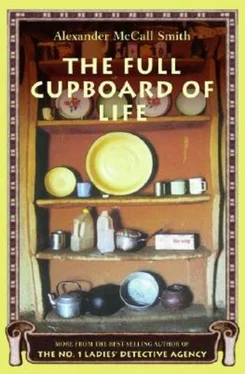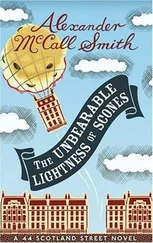Alexander Smith - The Full Cupboard of Life
Здесь есть возможность читать онлайн «Alexander Smith - The Full Cupboard of Life» весь текст электронной книги совершенно бесплатно (целиком полную версию без сокращений). В некоторых случаях можно слушать аудио, скачать через торрент в формате fb2 и присутствует краткое содержание. Жанр: Триллер, на английском языке. Описание произведения, (предисловие) а так же отзывы посетителей доступны на портале библиотеки ЛибКат.
- Название:The Full Cupboard of Life
- Автор:
- Жанр:
- Год:неизвестен
- ISBN:нет данных
- Рейтинг книги:4 / 5. Голосов: 1
-
Избранное:Добавить в избранное
- Отзывы:
-
Ваша оценка:
- 80
- 1
- 2
- 3
- 4
- 5
The Full Cupboard of Life: краткое содержание, описание и аннотация
Предлагаем к чтению аннотацию, описание, краткое содержание или предисловие (зависит от того, что написал сам автор книги «The Full Cupboard of Life»). Если вы не нашли необходимую информацию о книге — напишите в комментариях, мы постараемся отыскать её.
The Full Cupboard of Life — читать онлайн бесплатно полную книгу (весь текст) целиком
Ниже представлен текст книги, разбитый по страницам. Система сохранения места последней прочитанной страницы, позволяет с удобством читать онлайн бесплатно книгу «The Full Cupboard of Life», без необходимости каждый раз заново искать на чём Вы остановились. Поставьте закладку, и сможете в любой момент перейти на страницу, на которой закончили чтение.
Интервал:
Закладка:
CHAPTER FOUR
THAT MONDAY, Mma Ramotswe had an appointment. Most of her clients did not bother to arrange a time to see her, preferring to drop in unannounced and-in some cases-without disclosing their identity. Mma Ramotswe understood why people should wish to do this. It was not easy to consult a detective agency, especially if one had a problem of a particularly private nature, and many people had to pluck up considerable courage before they knocked on her door. She understood that doctors sometimes encountered similar behaviour; that patients would talk about everything except the real problem and then, at the last moment, mention what was really troubling them. She had read somewhere-in one of the old magazines that Mma Makutsi liked to page through-of a doctor who had been consulted by a man wearing a paper bag over his head. Poor man, thought Mma Ramotswe. It must be terrible to feel so embarrassed about something that one would have to wear a paper bag over one’s head! What was wrong with that man? she wondered. Things did go wrong with men sometimes that they were ashamed to talk about, but there was really no need to feel that way.
Mma Ramotswe had never encountered embarrassment of such a degree, but she had certainly had to draw stories out of people. This happened most commonly with women who had been let down by their husbands, or who suspected that their husbands were having an affair. Such women could feel anger and a sense of betrayal, both of which were entirely understandable, but they could also feel shame that such a thing had happened to them. It was as if it was their fault that their husband had taken up with another woman. This could be so, of course; there were women who drove their husbands away, but in most cases it was because the husband had become bored with his marriage and wanted to see a younger woman. They were always younger, Mma Ramotswe reflected; only rich ladies were able to take up with younger men.
The thought of rich ladies reminded her: the woman who was coming to see her that day was undoubtedly a rich lady. Mma Holonga was well-known in Gaborone as the founder of a chain of hairdressing salons. The salons were successful, but what had proved even more profitable was her invention, and marketing, of Special Girl Hair Braiding Preparation. This was one of those mixtures which women put on their hair before they braided it; its efficacy was doubtful, but the hair products market was not one which required a great deal of scientific evidence. What mattered was that there was a sufficient number of people who believed that their favourite preparation worked.
Mma Ramotswe had never met Mma Holonga. She had seen her picture in Mmegi and the Botswana Guardian from time to time, and in the photographs she had noticed a pleasant, rather round face. She knew, too, that Mma Holonga lived in a house in the Village, not far from Mr J.L.B. Matekoni. She was intrigued to meet her, because from what she had seen in the newspapers she had formed the impression that Mma Holonga was an unusual rich lady. Many such women were spoilt and demanding, and frequently had an exaggerated idea of their own importance. Mma Holonga did not seem like that.
And when she arrived for her appointment, at exactly the right time (which was another point in her favour), Mma Holonga confirmed Mma Ramotswe’s advance impressions.
“You are very kind to see me,” she said as she sat down on the chair in front of Mma Ramotswe’s desk. “I can imagine how busy you must be.”
“Sometimes I am busy,” said Mma Ramotswe. “And then sometimes I am not. I am not busy today. I am just sitting here.”
“That is very good,” said Mma Holonga. “It is good just to sit sometimes. I like to do that, if I get the chance. I just sit.”
“There is a lot to be said for that,” agreed Mma Ramotswe. “Although we would not want people to do it all the time, would we?”
“Oh no,” said Mma Holonga hurriedly. “I would never recommend that.”
For a few moments there was silence. Mma Ramotswe looked at the woman in front of her. As the newspaper photographs had suggested, she was traditionally built about the face, but also everywhere else, and her dress was straining at the sides. She should move up a size or two, thought Mma Ramotswe, and then those panels on the side would not look as if they were about to rip. There really was no point in fighting these things: it is far better to admit one’s size and indeed there is even a case for buying a slightly larger size. That gives room for manoeuvre.
Mma Holonga was also taking the opportunity to sum up Mma Ramotswe. Comfortable, she thought; not one of these undernourished modern ladies. That is good. But her dress is a bit tight, and she should think of getting a slightly larger size. But she has a friendly face-a good, old-fashioned Botswana face that one can trust, unlike these modern faces which one saw so much of these days.
“I am glad that I came to see you,” said Mma Holonga. “I had heard that you were a good person for this sort of thing. That’s what people tell me.”
Mma Ramotswe smiled. She was a modest person, but a compliment was never unwelcome. And she knew, of course, how important it was to compliment others; not in any insincere way, but to encourage people in their work or to make them feel that their efforts had been worthwhile. She had even complimented the apprentices on one occasion, when they had gone out of their way to help a customer, and for a short time it seemed as if this had inspired them to take a pride in their work. But after a few days she assumed that her words had been forgotten, as they forgot everything else, since they returned to their usual, sloppy habits.
“Oh yes,” Mma Holonga continued. “You may not know it, Mma, but your reputation in this town is very high. People say that you are one of the cleverest women in Botswana.”
“Oh that cannot be true,” said Mma Ramotswe, laughing. “There are many much cleverer ladies in Botswana, ladies with BAs and BScs. There are even lady doctors at the hospital. They must be much cleverer than I am. I have just got my Cambridge Certificate, that is all.”
“And I haven’t even got that,” said Mma Holonga. “But I don’t think that I am any less intelligent than those apprentices out there in the garage. I assume they have their Cambridge Certificate too.”
“They are a special case,” said Mma Ramotswe. “They have passed their Cambridge Certificate, but they are not a very good advertisement for education. Their heads are quite empty. They have nothing in them except thoughts of girls.”
Mma Holonga glanced through the doorway to where one of the apprentices could be seen sitting on an upturned oil-drum. She appeared to study him for a moment before she turned back to Mma Ramotswe. Mma Ramotswe noticed; it was only a momentary stare, she thought, but it told her something: Mma Holonga was interested in men. And why should she not be? The days when women had to pretend not to be interested in men were surely over, and now they could talk about it. Mma Ramotswe was not sure whether it was a good idea to talk too openly about men-she had heard some quite shocking things being said by some women, and she would never condone such shamelessness-but it was, on the whole, better for women to be able to express themselves.
“I have come to see you about men,” said Mma Holonga suddenly. “That is why I am here.”
Mma Ramotswe was taken aback. She had wondered why Mma Holonga had come and had assumed that it was something to do with one of her businesses. But now it seemed it was going to be something rather more personal than that.
“There are many women who come to see me about men,” she said quietly. “Men are a major problem for many women.”
Читать дальшеИнтервал:
Закладка:
Похожие книги на «The Full Cupboard of Life»
Представляем Вашему вниманию похожие книги на «The Full Cupboard of Life» списком для выбора. Мы отобрали схожую по названию и смыслу литературу в надежде предоставить читателям больше вариантов отыскать новые, интересные, ещё непрочитанные произведения.
Обсуждение, отзывы о книге «The Full Cupboard of Life» и просто собственные мнения читателей. Оставьте ваши комментарии, напишите, что Вы думаете о произведении, его смысле или главных героях. Укажите что конкретно понравилось, а что нет, и почему Вы так считаете.












